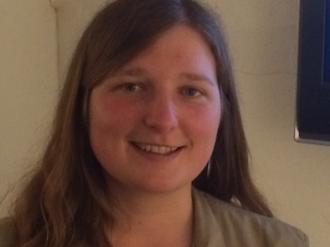International Children's Day 3: Terror at the checkpoints

Hannah Griffiths
Human rights monitor Hannah Griffiths gave a moving account of her experience working in Hebron on the West Bank, with the Ecumenical Accompaniment Programme in Palestine and Israel recently. In her talk at the Travelling Through Bookshop in Waterloo, she described how her main duty was to accompany children to school each day - a simple enough task - until you realise that these children, some as young as three, have to pass through checkpoints and dozens of soldiers carrying guns in order to get to school. They often have their bags searched for stones, must pass by hostile crowds of abusive armed settlers and are sometimes sprayed with 'stink water' or tear gas.
Hannah showed us a map of Hebron, an ancient Palestinian city, which is now surrounded by ever-expanding illegal settlements, and riddled with barriers and checkpoints manned by heavily armed soldiers. The school she worked at - Cordoba Primary School is situated in such a vulnerable position in an Israeli-controlled portion of the city, that the head teacher will not open classes unless human rights monitors are present to accompany the 148 Palestinian pupils to school and remain in the playground during breaks.
Hannah said walking down Shuhada Street - is normally an eerie experience because of the shuttered windows and doors and the lack of people - but now there is an added fear. The street, and the checkpoint and stairs through which the children must walk to get to school, opposite the Beit Hadassah Israeli settlement, is the place where two Palestinians, were shot - one on October 17 by a settler, and one on October 29 by an Israeli soldier. In both cases, the victims were allegedly armed with knives - but Amnesty International has cast doubt on these claims in their recent report.
The location of Cordoba primary school makes it particularly vulnerable to attacks from settlers. In the past, they have uprooted trees in the school grounds and a 12-year-old settler child physically attacked a Palestinian pupil.
Hannah said in recent months she and her colleagues have observed an increasing number and frequency of unprovoked physical and verbal attacks upon both children and teachers.
What impact does such an environment have on young children? Hannah said parents and teachers report that many children suffer from anxiety and stress-related symptoms such as nightmares, bedwetting and greater sensitivity to loud noises - due to the sound-bombs which are regularly heard from the school. Recently there have been fewer children at school and those who do attend have achieved lower marks.
One boy, Qusai who is ten, told her: "I am afraid of settlers and scared of soldiers. They try to scare us by pointing their guns at us and stamping their feet. Settlers also drive very fast past us."
When asked how he feels when he sees Ecumenical Accompaniers, Qusai said: "when we see settlers we want to turn back and go home, but when we see EAs we feel safer and keep walking."
EAPPI and other organisations are calling upon the Israeli authorities to fulfil their responsibility as outlined by international law and enable safe access to education for the children at Cordoba and other schools in Hebron. They say settlers must be held to account for their actions and their impunity, which is not only condoned but enabled by the Israeli army, must be addressed.
"Every child deserves to access school and be and feel safe when they do so."
On a more positive note, Hannah described the warm hospitality of the Palestinians, their wonderful food, and the beauty of the landscape. She said she hopes to return again one day.
Hannah also outlined ways in which we can support positive change in the region - through developing links with Israeli peace groups, campaigning, twinning and friendship links, supporting aid and development and prayer.
Hannah was joined by Madeleine McGivern, who was an Ecumenical Accompanier in 2011. Her photography exhibition 'Sage Tea and Sunshine: An Alternative View Of Palestine' is running at the venue until the end of this week.
The Travelling Through Bookshop and Cafe, is at 131 Lower Marsh, Waterloo, SE1 7AE.
To learn more about the Ecumenical Accompaniment Programme in Palestine and Israel see: www.quaker.org.uk/our-work/international-work/eappi
See also: ICN 31 May 2016 International Children's Day 2: Turbulent school year in Hebron - film- www.indcatholicnews.com/news.php?viewStory=30188


















